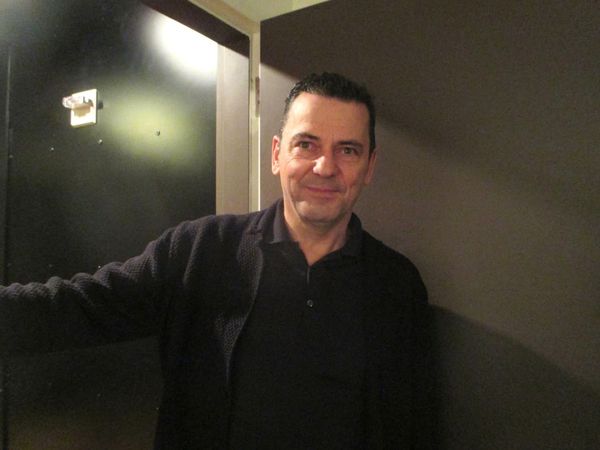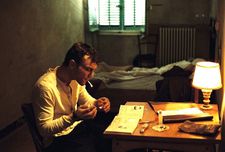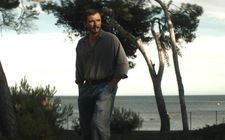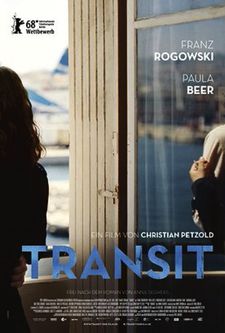 |
| Christian Petzold: "Transit is the first movie in 20 years where the main character is a male." Photo: Anne-Katrin Titze |
Christian Petzold joined me for a conversation at the Film Society of Lincoln Center when he was in New York for Carte Blanche: Christian Petzold Selects and a sneak preview screening of Transit. He brought up Claude Chabrol's work with Stéphane Audran (Les Cousins, Les Bonnes Femmes, Les Biches, Le Boucher, The Twist, and Jours Tranquilles à Clichy) and Isabelle Huppert (Violette Nozière with Audran, Story Of Women, Madame Bovary, La Cérémonie, The Swindle, Merci Pour Le Chocolat and Comedy Of Power). Julia Hummer and Nina Hoss, George Romero's Dawn Of The Dead, Alex Brendemühl, a Franz Kafka-like "hell construction" in Anna Seghers' novel and the books of William Burroughs also emerged.
 |
| Marie (Paula Beer) with Georg (Franz Rogowski) in Transit |
Shot by his longtime cinematographer Hans Fromm, Transit is Christian Petzold's "first movie in 20 years where the main character is a male" and he found himself "very very near" to the role of Georg played by Franz Rogowski, a man trapped in limbo, for decades, much longer it seems than he himself has been alive.
Anne-Katrin Titze: In Transit, Georg seems trapped in time. As if he arrived in this state of limbo in 1942 and is still there.
Christian Petzold: Yes. I must say, this is the first movie … The good thing with the work with Nina Hoss was that I am not the character. Two years ago I was in Switzerland in a town called Basel. There's a fantastic cinematheque in Basel and they had a retrospective of all Chabrol movies.
I walked around and I just had two or three hours and there was a display case with an interview with Claude Chabrol in it. And they asked him "Why are all your main protagonists female?" Stéphane Audran, Isabelle Huppert and so on. And he said, in German it's better, I think: "Die Männer leben. Die Frauen überleben." [Men live. Women survive.] The women are survivors. Cinema is always interested in survivors.
 |
| Isabelle Huppert starred in seven of Claude Chabrol's films Photo: Anne-Katrin Titze |
For me that was a good sentence because I asked myself - Julia Hummer, Nina Hoss, they all were female. Transit is the first movie in 20 years where the main character is a male. And I found myself very very near to this character. So in the next one [Undine] the main protagonist is female again [played by Paula Beer].
AKT: You've had enough closeness?
CP: I know many things about myself after Transit.
AKT: In his timeless clothing, Georg is stuck there in Marseille, connected to the Anna Seghers story but also connected to the jungle and everything going on from 1942 to 2018.
CP: Yes, that's right.
AKT: In a strange way, he is deathless?
CP: Yes, he's deathless. My target was, I remember it now for the first time, my target was to show that the refugees who have lost all their ballast, which means all their culture, their memories, at least they have a better story than we. So when he's [Georg] sitting in this restaurant in the end of the movie, she's [Paula Beer as Marie] coming back from the land of death.
AKT: There's Vertigo, your second-favourite movie!
 |
| Christian Petzold on Georg (Franz Rogowski): "I know many things about myself after Transit." |
CP: But she's coming back and they have a really tragic hero story. And we are not part of the story any more. Therefore there is not the reverse shot. Because this picture, it's for him. They don't need us any more. They are living their own lives. This was my target.
AKT: The passport says Deutsches Reich, at the same time there are zombies at the mall. The logic is that of our memories where we scramble times. Especially as Germans, the history comes with you, the ballast is always there.
CP: Like this, they have no ballast but the ballast is coming in this movie. There's a letter to a hotel. In the hotel there's a typewriter machine, Deutsches Reich. Then he met a guy who is telling him a story about a movie by George Romero [Dawn Of The Dead]. They, the refugees, nobody from the society will give them space or room to live in. So they create a room by themselves. This is a little bit the idea.
AKT: Alex Brendemühl is wonderful as the consul. He's bilingual, isn't he?
CP: He's from Catalonia. I think he's the son of communists who grew up in East Berlin.
AKT: There we go. I saw him in The Land Of The Moon, Nicole Garcia's terrific film. Have you seen it?
 |
| Christian Petzold on Alex Brendemühl as the Mexican Consul in Transit, who is seen here in Nicole Garcia's Land Of The Moon: "I think he loves the desk. To be on the other side of the power." |
CP: No, but I saw a sequence out of it when I met him.
AKT: He's a perfect consul.
CP: I think he loves the desk. To be on the other side of the power.
AKT: Who wouldn't from time to time? We all have these moments of frustration and powerlessness. I had one of the worst travel days on the New York subway today. What should take half an hour, took me two hours today. When I mentioned it to Aimee [Morris] she said, "How perfect on the day when you do an interview about a film called Transit." And you, I heard, missed your connecting flight?
CP: I lived in this boarding zone in London. Yeah, everything is getting faster but we are standing stiller. It's like this hell construction which Anna Seghers had taken out of Franz Kafka.
AKT: Trapped there and the Mistral is blowing, breathing down your neck. He is losing his breath. One last thing. Georg knew that the woman at the hotel will betray him. The German word "Menschenkenntnis" [knowledge of human nature] came to mind.
 |
| Transit US poster - opens in New York on March 1 |
CP: "Menschenkenntnis" is a very good German word for this. When you read books by people like Burroughs. Naked Lunch. All these people are heroin addicted, they came into a strange town they'd never been in before.
But they know from the first moment, this is a guy I can talk to. Here, this guy not. They have a social intelligence. And refugees always have a social intelligence. They have to read the city.
They have to read who's loyal and who will betray me. And this woman at this hotel, she makes jokes, she is flirting a little bit. So he knows, one, two days. Not more. Then she will go to the police and get money from the police. "She'll take my money and the police money." He knows everything. And he is right.
AKT: I had to think of the Aryan Papers [the abandoned Kubrick movie, based on Louis Begley's novel Wartime Lies]. The book focuses often on the questions how much can you read people? How well can you anticipate?
CP: That's right.
Read what Christian Petzold had to say on A Day In The Country, Summer With Monika, The 400 Blows and looking at us.
Transit is in cinemas and available at Curzon Home Cinema now.





















